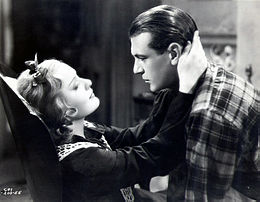
Gary Cooper was an American actor known for his strong, quiet screen persona and understated acting style. He won the Academy Award for Best Actor twice and had a further three nominations, as well as an Academy Honorary Award in 1961 for his career achievements. He was one of the top-10 film personalities for 23 consecutive years and one of the top money-making stars for 18 years. The American Film Institute (AFI) ranked Cooper at number 11 on its list of the 25 greatest male stars of classic Hollywood cinema.
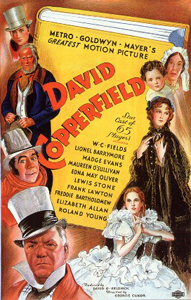
David Copperfield is a 1935 American film released by Metro-Goldwyn-Mayer based upon Charles Dickens' 1850 novel The Personal History, Adventures, Experience, & Observation of David Copperfield the Younger.
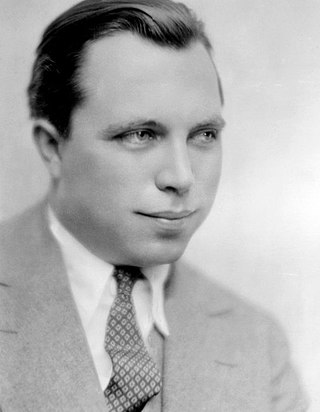
King Wallis Vidor was an American film director, film producer, and screenwriter whose 67-year film-making career successfully spanned the silent and sound eras. His works are distinguished by a vivid, humane, and sympathetic depiction of contemporary social issues. Considered an auteur director, Vidor approached multiple genres and allowed the subject matter to determine the style, often pressing the limits of film-making conventions.
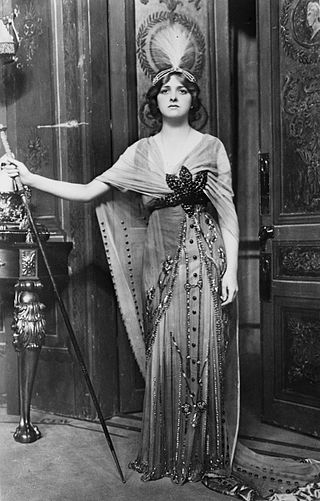
Dame Gladys Constance Cooper, was an English actress, theatrical manager and producer, whose career spanned seven decades on stage, in films and on television.

Come and Get It is a 1936 American lumberjack drama film directed by Howard Hawks and William Wyler. The screenplay by Jane Murfin and Jules Furthman is based on the 1935 novel of the same title by Edna Ferber.

The Westerner is a 1940 American Western film directed by William Wyler and starring Gary Cooper, Walter Brennan and Doris Davenport. Written by Niven Busch and Jo Swerling, the film concerns a self-appointed hanging judge in Vinegaroon, Texas, who befriends a saddle tramp who opposes the judge's policy against homesteaders. The film is remembered for Walter Brennan's performance as Judge Roy Bean, for which he won his record-setting third Academy Award for Best Supporting Actor. James Basevi and Stuart N. Lake also received Academy Award nominations for Best Art Direction, Black and White and Best Story, respectively. The supporting cast features Dana Andrews, Chill Wills and Forrest Tucker.
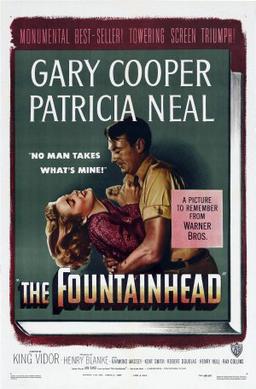
The Fountainhead is a 1949 American black-and-white drama film produced by Henry Blanke, directed by King Vidor, and starring Gary Cooper, Patricia Neal, Raymond Massey, Robert Douglas and Kent Smith. The film is based on the bestselling 1943 novel of the same name by Ayn Rand, who also wrote the adaptation. Although Rand's screenplay was used with minimal alterations, she later criticized the editing, production design and acting.

Reckless is a 1935 American musical film directed by Victor Fleming and starring Jean Harlow, William Powell, Franchot Tone, and May Robson. David O. Selznick wrote the story, using the pseudonym Oliver Jeffries, basing it loosely on the scandal of the 1931 marriage between torch singer Libby Holman and tobacco heir Zachary Smith Reynolds, and his death by a gunshot wound to the head.

Barbary Coast is a 1935 American historical Western film directed by Howard Hawks. Shot in black-and-white and set in San Francisco's so-called Barbary Coast during the California Gold Rush, the film combines elements of the Western genre with those of crime, melodrama and adventure. It features a wide range of actors, from hero Joel McCrea to villain Edward G. Robinson, and stars Miriam Hopkins in the leading role as Mary 'Swan' Rutledge. In an early, uncredited appearance, David Niven plays a drunken sailor being thrown out of a bar.

Helen Vinson was an American film actress who appeared in 40 films between 1932 and 1945.
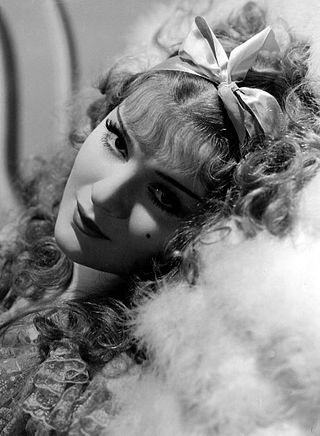
Anna Sten was a Ukrainian-born American actress. She began her career in stage plays and films in the Soviet Union, then traveled to Germany, where she starred in several films. Her performances were noticed by film producer Samuel Goldwyn, who brought her to the United States with the aim of creating a screen personality to rival Greta Garbo. After a few unsuccessful films, Goldwyn released her from her contract. She continued to act occasionally until her final film appearance in 1962.

Peter Ibbetson is a 1935 American black-and-white drama/fantasy film directed by Henry Hathaway and starring Gary Cooper and Ann Harding. The film is loosely based on the 1891 novel of the same name by George du Maurier. A tale of a love that transcends all obstacles, it relates the story of two youngsters who are separated in childhood and then drawn together by destiny years later. Even though they are separated in real life because Peter is unjustly convicted of murder, they discover they can dream themselves into each other's consciousness while asleep. In this way, they live out their lives together. The transitions between reality and fantasy are captured by the cinematography of Charles Lang, as discussed in the documentary Visions of Light (1992).

Black Fury is a 1935 American crime film directed by Michael Curtiz and starring Paul Muni, Karen Morley, and William Gargan. It was adapted by Abem Finkel and Carl Erickson from the short story "Jan Volkanik" by Judge Michael A. Musmanno and the play Bohunk by Harry R. Irving. The plot is based on a historic incident during a Pennsylvania walk-out in 1929, in which John Barkowski, a striking coal miner, was beaten to death by private company police.
Public Hero ﹟1 is a 1935 American crime film starring Lionel Barrymore, Jean Arthur, Chester Morris and Joseph Calleia. The Metro-Goldwyn-Mayer production was directed by J. Walter Ruben.

We Live Again is a 1934 American film directed by Rouben Mamoulian and starring Anna Sten and Fredric March. The film is an adaptation of Leo Tolstoy's 1899 novel Resurrection (Voskraeseniye). The screenplay was written by Maxwell Anderson with contributions from a number of writers, including Preston Sturges and Thornton Wilder.
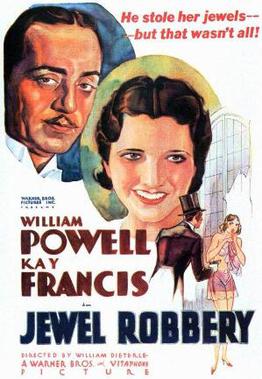
Jewel Robbery is a 1932 American pre-Code romantic comedy heist film, directed by William Dieterle and starring William Powell and Kay Francis. It is based on the 1931 Hungarian play Ékszerrablás a Váci-utcában by Ladislas Fodor and its subsequent English adaptation, Jewel Robbery by Bertram Bloch.
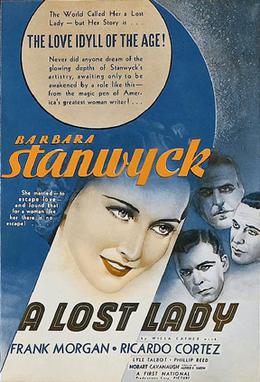
A Lost Lady is a 1934 American drama film directed by Alfred E. Green and starring by Barbara Stanwyck, Frank Morgan, and Ricardo Cortez. Based on the 1923 novel A Lost Lady by Willa Cather, with a screenplay by Gene Markey and Kathryn Scola, the film is about a woman whose fiancé is murdered by his mistress' husband two days before their wedding. Her uncle sends her away to the mountains, where she meets a man who looks after her and eventually proposes. She accepts even though she does not love him.

Exile Express is a 1939 American drama film directed by Otis Garrett and starring Anna Sten, Alan Marshal and Jerome Cowan.
Nana is a 1934 American pre-Code film, produced by Samuel Goldwyn, released through United Artists, starring Anna Sten. and directed by Dorothy Arzner and George Fitzmaurice.

Doomsday is a 1928 American romance drama silent film directed by Rowland V. Lee and starring Florence Vidor and Gary Cooper. Written by Julian Johnson, Donald W. Lee, and Doris Anderson, based on the 1927 novel Doomsday by Warwick Deeping, the film is about a woman who marries a wealthy landowner to escape her life of poverty, leaving behind the handsome farmer she truly loves. Produced by Jesse L. Lasky, Rowland V. Lee, Hector Turnbull, and Adolph Zukor for Paramount Pictures, Doomsday was released on February 18, 1928 in the United States.

